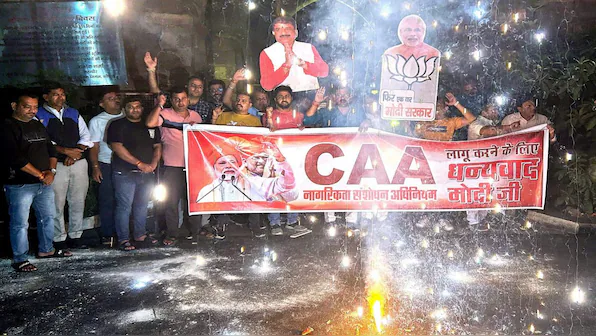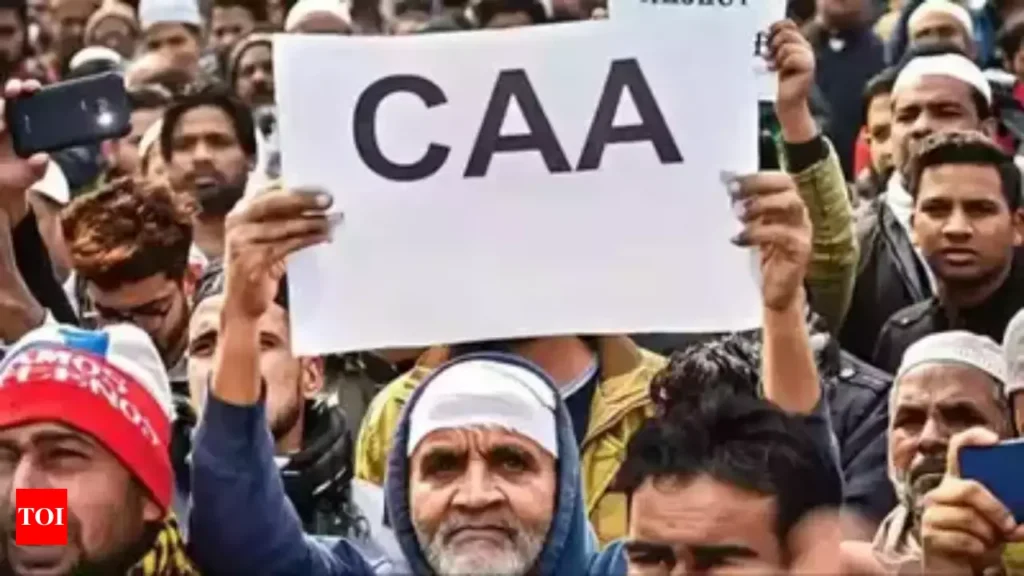
The Indian Home Ministry has officially implemented the Citizenship Amendment Act, with the aim of providing support to religious minorities from Pakistan, Bangladesh, and Afghanistan who have been subjected to persecution in their respective homelands, in their pursuit of acquiring Indian citizenship.
These rules allow individuals from Hindu, Sikh, Jain, Christian, Buddhist, and Parsi communities who migrated to India on or before December 31, 2014, from Pakistan, Bangladesh, and Afghanistan to apply for Indian citizenship.
The Citizenship Amendment Act (CAA) was passed in December 2019 and came into effect on January 10, 2020. However, due to the absence of notified rules, the Act could not be implemented. The Act faced opposition from certain groups and political parties who labeled it as discriminatory and demanded its repeal.

The Act also provides a pathway to citizenship for immigrants who have resided in India for at least five of the past 14 years or have been in the country for the previous year. The government has reduced the residency requirement for certain classes of illegal immigrants from 11 years to five years, marking a significant change in the naturalization process for citizenship.
Following the announcement, opposition leaders accused the BJP-led government of using diversionary tactics and seeking publicity in the run-up to the 2024 Lok Sabha elections.
Eligibility for Citizenship:
- Individuals of Indian origin seeking to register as Indian citizens
- Individuals married to an Indian citizen seeking to register as Indian citizens
- Minor children of Indian citizens seeking to register as Indian citizens
- Individuals whose parents are registered as Indian citizens seeking to register as Indian citizens
- Individuals who, or whose parents, were citizens of Independent India seeking to register as Indian citizens
- Individuals registered as Overseas Citizens of India Cardholders
Documents Required for CAA Citizenship Application:
The Indian government has issued comprehensive guidelines and a list of required documents for individuals applying for citizenship under the CAA. To qualify for citizenship under the CAA, applicants must belong to one of the specified religious communities from the three countries, must have entered India on or before December 31, 2014, and must have been exempted from the Foreigners Act, 1946 and the Passport (Entry into India) Act, 1920.
The application requires three sets of documents:
- Proof of religious identity and nationality from Afghanistan, Bangladesh, or Pakistan such as passport, birth certificate, government ID cards, school certificates, land records, licenses issued by government authorities in these countries.
- Proof of entry into India on or before 31.12.2014 such as visa, immigration stamp, registration certificates, ration card, government-issued IDs, employment records, utility bills, school certificates from India.
- An affidavit sworn before a judicial or executive magistrate declaring the applicant’s nationality and religion.
Additional documents may be required depending on the category under which the applicant is seeking citizenship, such as a marriage certificate, birth certificates of parents, etc.
The applications will be verified by district-level and state-level committees before a final decision is made. Applicants will need to attend in-person verification with original documents.
Approved applicants will receive digital certificates of registration, though physical copies can be requested. The citizenship will be effective from the date the applicant first entered India.
The application for citizenship by naturalization, as outlined in Form VIIIA, requires several key steps and the submission of specific documentation:
- Form VIIIA Submission: The applicant submits Form VIIIA, which includes all necessary personal details and information required for the naturalization process.
- Affidavit Verification: The applicant must provide an affidavit verifying the accuracy of the statements made in the application.
- Character Affidavit: Additionally, the applicant must furnish an affidavit from an Indian citizen attesting to the applicant’s character.
- Language Declaration: The applicant is required to declare that they possess adequate knowledge of one of the languages specified in the Eighth Schedule to the Constitution of India.
Procedure for Submitting Citizenship Application
In accordance with Section 6B of the Citizenship Act, 1955, those desiring to register or naturalize must adhere to a distinct application procedure:
- Application Submission: Applicants are required to electronically submit their applications to the Empowered Committee via the District Level Committee appointed by the Central Government.
- Acknowledgment: A digital acknowledgment in Form IX is generated upon application submission.
- Verification of Documents: The District Level Committee, under the guidance of a Designated Officer, validates the documents provided with the application.
- Oath of Allegiance: The Designated Officer administers the oath of allegiance, as outlined in the Second Schedule to the Citizenship Act, 1955, to the applicant. The signed oath, along with the document verification confirmation, is electronically sent to the Empowered Committee.
- Consideration for Refusal: If an applicant does not appear in person despite ample opportunities, the District Level Committee sends the application to the Empowered Committee for refusal consideration.
- Declaration of Renunciation: Each application includes a declaration from the applicant, irrevocably renouncing their current country’s citizenship without any future claim.
- Necessary Documents: Every application should include copies of documents as specified in Schedule IA and IB, along with an affidavit in the format outlined in Schedule IC.
This procedure ensures that applicants meet the necessary criteria and accept legal responsibilities as part of their citizenship application under Section 6B of the Citizenship Act, 1955.
Following the announcement of the contentious amendments to the citizenship law, the Ministry of Home Affairs launched a portal the next day for individuals eligible to apply for Indian citizenship under the new provisions.
MHA Introduces Portal for CAA-based Indian Citizenship Applicants:
The government will soon launch a mobile app ‘CAA-2019’ to aid applications. The portal offers FAQs (Frequently Asked Questions) to clarify the application process and other matters.
As per a post on X by the MHA spokesperson, “The Citizenship (Amendment) Rules, 2024 under the CAA-2019 have been announced. A new portal has been introduced, and individuals eligible under CAA-2019 can apply for citizenship on this portal https://indiancitizenshiponline.nic.in. A mobile app ‘CAA-2019’ will also be launched soon to aid applications…”
The rules, which facilitate the implementation of the CAA, state that “any document” proving that one of the applicant’s parents, grandparents, or even great-grandparents was from one of these countries would be sufficient to establish their nationality. They also state that a certificate issued by an elected member of a local body would suffice instead of a visa.
You might also be interested in – Modi govt implements CAA ahead of Lok Sabha elections



